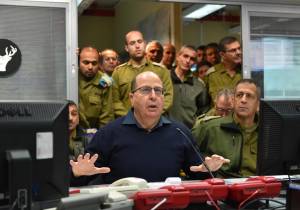IDF Tanks Rumble North in Preparation for Possible Hezbollah Reprisal
While Israel’s military is on high alert in the North in case of a retaliatory attack by Hezbollah, Israel asked Russia to convey to Iran that it seeks to prevent escalation.
The IDF and other arms of the Israeli security apparatus have been on extremely high alert since the Israeli Air Force attack last Sunday on a convoy carrying Hezbollah terrorists and an Iranian general in the Golan Heights.
The IDF moved a sizable force, including tanks, combat units and artillery to the northern border in anticipation of a possible retaliatory attack by Hezbollah, possibly directed by Iran, emanating from Lebanon or Syria. Hezbollah is a terror proxy of Iran.
The IDF further boosted its presence within communities near the border, fearing a possible border incursion by terrorists.
Local residents are quoted as saying that they have not seen such a military presence since the Second Lebanon War against Hezbollah in the summer of 2006.
Convoys of military vehicles were seen moving northward on Israeli roads throughout the weekend.
Chief of Staff Benny Gantz has been closely monitoring the IDF’s preparedness. He canceled a scheduled trip to Europe, instead visiting the northern front on Friday and Saturday.
The IDF’s Northern Command reportedly told residents to expect road closures and an increase of military traffic on roads, as well as air force activity overhead.

Brigadier General Hossein Salami. (Farsnews)
Iran continued to threaten Israel over the weekend. Brigadier General Hossein Salami, lieutenant commander of the Islamic Revolutionary Guards Corps (IRGC), warned that the Israeli attack last Sunday, in which a number of Hezbollah terrorists and an Iranian general were killed, will certainly get a “crushing response,” the Iranian Fars new agency reports.
“In addition to the reopening of the West Bank [front], as a move done especially in retaliation for the incident, we will surely take revenge for the attack with a specific move,” Salami said in an interview with the Iran-based, Arabic-language al-Alam news channel on Saturday.
Abu Imad Al-Rifai, the Palestinian Islamic Jihad representative in Lebanon, boasted on Al-Jadeed TV last Monday: “When the Syrians see that there is a war between Israel and the [Syrian] regime, a large part of the opposition will stand alongside the regime and fight the Israeli enemy.”
“We are part of the resistance [terror fighting Israel], and we will be at the middle of the fighting with the Israeli enemy if it breaks out. Within 72 hours, half of the Galilee will have fallen into the hands of the resistance, because the Israeli army’s ability to stand ground has been corroded,” he declared.
These threats were made after several Hezbollah commanders and Iranian generals had voiced similar threats.
Ya’alon: Israel is Vigilant and Prepared

Defense Minister Moshe Ya’alon during the Friday briefing. (Photo: Ariel Hermony/MOD)
Responding to these threats, Defense Minister Moshe Ya’alon said, during a visit to the Northern Command’s headquarters in Safed on Friday, that Israel will not tolerate any hindering of its security, vowing that it will respond “with force against any such attempt.”
“We must be prepared for any attempt to challenge us in light of calls heard on the other side,” Ya’alon said. “We must continue to keep calm, be patient and know how to respond in the most suitable manner, which will clarify to all who try to harm us that we will not tolerate provocations from any area.”
“Israel will view governments, regimes and organizations that lie beyond its northern border as being responsible for what happens in their territory, and it knows how to exact a price in any case of harm to Israeli sovereignty, civilians or soldiers,” Ya’alon warned. “I call on residents of the North and visitors to maintain their daily routines and to listen to IDF instructions if necessary. We will continue to act with determination, responsibility and sound judgment to safeguard the security of Israeli civilians.”
Israel reportedly sent calming messages to Iran and Hezbollah via Russia, Channel 10 reported Friday night, clarifying that it is uninterested in an escalating conflict with Tehran or the Lebanese-based terror organization.
That message, according to Channel 10, said that Israel viewed the strike last Sunday as an act of self-defense, and that Hezbollah had forced Israel’s hand by building an offensive infrastructure on its border. Jerusalem stressed it did not want the situation to deteriorate into a regional conflict. Russian leaders reportedly conveyed this message to Beirut and Tehran.
Israel’s intelligence assesses that a retaliatory attack is inevitable and that the question is where, when, and of what magnitude.
By Aryeh Savir

No comments:
Post a Comment
Thanks for commenting. Your comments are needed for helping to improve the discussion.